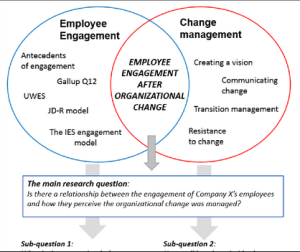Employee involvement is a critical factor in the success of change management initiatives. When employees are actively engaged and participate in the change process, they are more likely to embrace the changes, contribute their insights, and feel a sense of ownership over the outcomes. Here are key aspects of the role of employee involvement in change management:

The Role of Employee Involvement in Change Management
-
Table of Contents
ToggleEnhances Understanding and Buy-In:
- Involving employees from the early stages of change helps them understand the reasons behind the change, the desired outcomes, and the impact on their roles. This understanding contributes to a higher level of buy-in and commitment to the change.
-
Fosters a Sense of Ownership:
- When employees actively contribute to the planning and decision-making processes, they feel a sense of ownership over the changes.
-
Taps into Collective Knowledge:
- Employees possess valuable insights and knowledge about their roles, workflows, and the organization’s day-to-day operations. Involving them allows organizations to tap into this collective knowledge, ensuring that change plans are well-informed and address practical considerations.
-
Promotes Innovation:
- Employee involvement encourages a culture of innovation. Employees on the front lines often have creative ideas for improvement. By including them in the change process, organizations can harness this creativity and identify innovative solutions to challenges.
-
Builds Trust and Credibility:
- Trust is essential during times of change. When employees are involved in decision-making and their input is valued, it builds trust between employees and leadership. Trust, in turn, enhances the credibility of the change initiative.
-
Encourages Open Communication:
- Involvement promotes open communication between employees and leadership. Open communication helps address issues proactively.
-
Strengthens Team Collaboration:
- Collaborative efforts are essential for successful change. Involving employees in cross-functional teams or collaborative workshops fosters teamwork and strengthens relationships among employees, enhancing the organization’s ability to navigate change effectively.
-
Mitigates Fear and Uncertainty:
- Change can be unsettling, and employees may experience fear and uncertainty. Involving them in the process helps demystify the changes, provides clarity on expectations, and addresses concerns, thereby reducing fear and uncertainty.
-
Improves Implementation Effectiveness:
- Employees who have been involved in the planning and decision-making stages are better equipped to implement the changes effectively. Their hands-on knowledge and understanding of the change objectives contribute to a smoother implementation process.
-
Facilitates Continuous Improvement:
- Employee involvement is not just about a one-time contribution; it extends to continuous improvement. Engaged employees are more likely to provide ongoing feedback, contributing to the iterative refinement of processes and practices over time.
-
Supports Change Adaptability:
- Employee involvement contributes to a culture of adaptability. Engaged employees are more likely to embrace change as a continuous and evolving process, making the organization more resilient in the face of future changes.
In summary, employee involvement is a fundamental aspect of change management. Organizations that actively engage employees in the change process benefit from increased understanding, reduced resistance, enhanced innovation, and a more positive and adaptive organizational culture. Strategies for involving employees may include communication forums, workshops, cross-functional teams, and other collaborative approaches that foster a sense of partnership between employees and organizational leadership.
